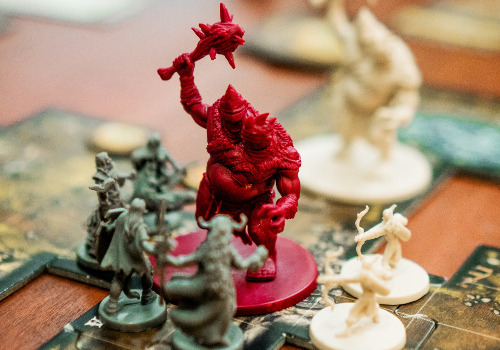Roleplaying for Better Storytelling

Character creation and development is a lot of writers favorite part of writing, so why not make a game out of it? Today NaNoWriMo participant Alice Radwell brings us a fun exercise to help us learn how our characters think and react in different situations:
Roleplaying is an exciting hobby enjoyed by enthusiasts around the world. Taking on campaigns, players seek to vanquish monsters and find treasure together, leveling-up characters through a stat-based points system. However, there’s more to it than just fun. Roleplaying can be useful in strengthening writing and creativity, and the two can connect together effectively to create powerful emotive characters and interesting plots within fiction.
The benefits of roleplaying as a storyteller are numerous. In the well-known and well-enjoyed game ‘Dungeons & Dragons’ and its counterparts, which span a plethora of genres and styles, players create a character with certain traits and characteristics and work within this mind-set to complete challenges imposed upon them by the game master. Without being aware of what will come next, players must navigate their character’s thinking patterns and limitations to work within a team to face down foes and problems. As a writer, this is a useful exercise in character development.
Sitting as a separate entity before a page, a writer must endeavor to accurately portray the thoughts, feelings, and motivations of their protagonist, but when roleplaying as said protagonist, the writer must react with those thoughts, feelings, and motivations in real-time, experiencing them first hand as situations unfold —and as such, they must experience the consequences first hand, be they positive or negative. It’s a very strange form of method acting, where during a quest the player is forced to place themselves in the head of their character and ask ‘How would I respond? What are my motivations?’ using personal pronouns in reference to their character rather than themselves.
“Having to work creatively like this breeds a spontaneous, quick thinking mindset perfect for beating writer’s block and keeping first drafts flowing.”So, let’s say, a roleplayer has entered the mindset of a young rogue. The game-master then announces a conundrum. A key is hidden in the pocket of an innocent man, and in order to retrieve it, the rogue is going to have to kill him. If you don’t kill him three captured peasants, also all innocent will be wrongfully executed. What would that rogue do? In a situation where a writer is sitting in front of a page, there is no great urgency to have the character act. A writer might ponder for days as to the moral threads of the character’s thinking, but in roleplaying, particularly with other players waiting on your move, time to contemplate isn’t a luxury you have. From the head of your character, you must react as they would in real-time. Having to work creatively like this breeds a spontaneous, quick thinking mindset perfect for beating writer’s block and keeping first drafts flowing.There’s also another interesting roleplaying trick to help create story events. This can be done alone and doesn’t require any specialist equipment that multi-player experiences might. Start by writing a few lists of places, objects, types of people, or conflicts. Another good idea is to get friends and family to write them, this way they will be a surprise for you. If using your own list, however, assign numbers and use a random number generator to pick one item from each list. Once you have a place, an object, a person and a conflict (or whatever works for you) start roleplaying your character in the middle of the situation. The idea is to think like them in that situation. Try not to think too long or too much, just react to what is happening as you write it. By forcing yourself to think like the protagonist in a scenario that is completely foreign to them, you are not only solidifying their motivations, actions, and feelings in your mind, you are also trailing scenes that you can contextualize to suit your story and advance your plot.
There are many ways to experiment with roleplaying which can help a writer develop creatively, both within a team and alone. It’s up to us as individuals to explore the possibilities, step into the minds of characters and create stories which we ourselves can enjoy as well as future readers.

Alice Radwell is a Creative Writing graduate living in Scotland. She spent her twenties working as an non-fiction Ghost Writer, but has loved writing from early childhood. She is currently working on a fantasy novel while raising a small human. She loves all things fantasy, chocolate, books and tea, and writes a personal blog at https://aliceradwell.wordpress.com/
Top photo by Clint Bustrillos on Unsplash.
Chris Baty's Blog
- Chris Baty's profile
- 63 followers



